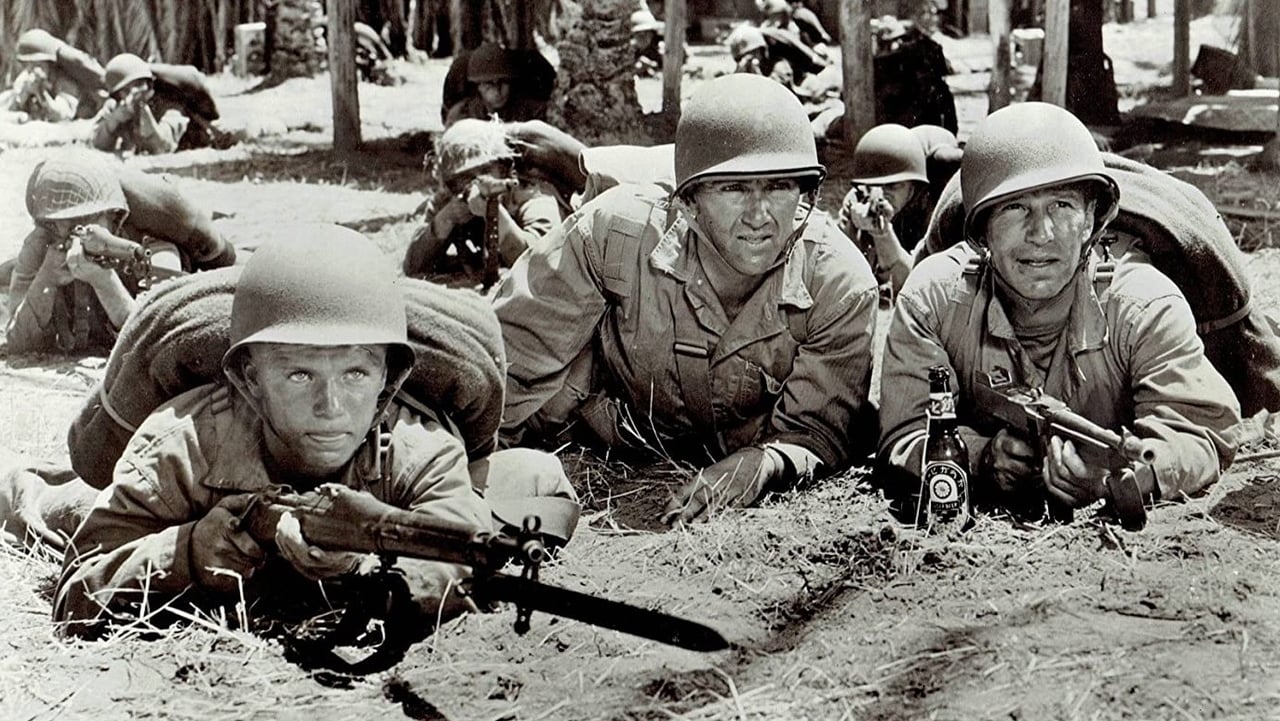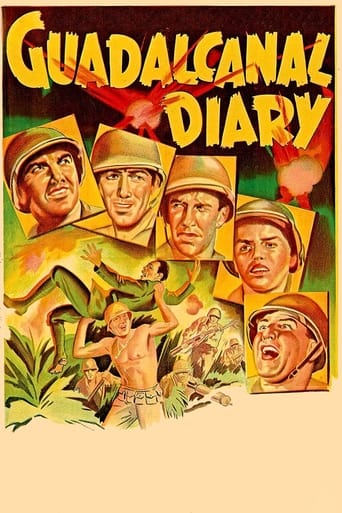

One of my all time favorites.
... View MoreLack of good storyline.
... View MoreIt's the kind of movie you'll want to see a second time with someone who hasn't seen it yet, to remember what it was like to watch it for the first time.
... View MoreTrue to its essence, the characters remain on the same line and manage to entertain the viewer, each highlighting their own distinctive qualities or touches.
... View MoreWar correspondent Richard Tregaskis's memoir of the battle for the strategic island of Guadalcanal provides the basis of this film with a solid cast of players. Tregaskis himself is played unnamed in the film by Reed Hadley, who's rich narrative voice greatly enhances the film.Guadalcanal Diary unfortunately has not aged well. It was made the year after Guadalcanal, together with its key airfield Henderson Field was finally cleared of Japanese. It was a slow, steady war of attrition, on both land and sea. While this film concerns the Marines on the island, at sea our navy was battling with the Japanese Navy in what was euphemistically called 'the slot' which was a channel that bisected the Solomon chain neatly in half. Our Marines dealt not only with the Japanese on the ground, but from Naval bombardment from the Japanese Fleet whenever they snuck in. The Japanese positions were in the jungle and further in land and were less affected by off shore shelling from us.All the types you expect from World War II are there, the tough Marine sergeant Lloyd Nolan, the Marine from Brooklyn, where else, William Bendix, the young recruit, Richard Jaeckel in his first film playing a teenager when he actually was one. Preston Foster plays the Catholic chaplain, a wise and compassionate fellow who once played football for Notre Dame. It's a page out of Pat O'Brien's Father Duffy portrayal from The Fighting 69th and Foster is the best one in the film.Sad to say that the Marines do refer to the Japanese as less than human on a few occasions. It's why the film doesn't age well, especially after Clint Eastwood's latest films about the Pacific Theater.Guadalcanal Diary still is a good film for those who are fans of World War II films made in the World War II years.
... View MoreThis wasn't bad, when you compare it to the average World War II film made back in the 1940s. In the first half, it had too many of the same negative aspects that many of its contemporary war movies had at the time. The narration was corny and the dialog by the GIs here is so dated and so racist it's embarrassing. Hey, I am the first to acknowledge how political correctness has run amok in recent years and, in fact, is out of control, but, still, hearing "Jap" yelled out every third sentence, and guys making slant-eyed "jokes" all the time is offensive, even for me.In that 40 minutes, we had the normal William Bendix-role of playing--a-clown-from- Brooklyn, the priest who is a good guy but too often indistinguishable from the soldiers, the young kid who looks and acts about 15, and most of the other cliché characters you see in this old movies. However, part of this was for a purpose: to show how these guys went from cocky, almost- ignorant soldiers who underestimated their foes, to veterans who calmed down and had their arrogant attitude kicked out of them. In fact, Bendix wound up making some very profound statements about 20 minutes from the end when things really looked bad. There's a lot of honesty in this movie, as it turned out.But, despite that first 40 minutes of mostly-inane chatter which took away from the sense of the guys being in a brutal situation, which these GIs were in - the second half made up for it. It had tons of drama, suspense and action, plus a plea or two to the folks back home in the USA watching this film. I have no problem with that. Why not? Our soldiers should always be given whatever they need since they're putting their lives on the line for us back here. Some people didn't like those, nor the prayers or the religious angle in here, but that's today's secular-progressives who have no tolerance. I read one big-city critic who objected to the scene showing the soldier disappointed he didn't get any mail! Give me a break. Sorry, but sometimes it's good to see a war movie with some old fashioned patriotism, "religion" and sentimentality.Overall, however, these 60-some-year-old movies just can't stack up to the realistic ones made today, and that's understandable. But, credit this film with having easily more actual war action than the average movie of its day and totally switched from dumb to pretty intelligent the last half of the movie.These guys got pummeled from the land, the sea and the air. It would be interesting to see this movie re-made today. It might be tough to watch with all the carnage, but I'd like to see it with a appropriate tribute to these brave men.The DVD sports a good transfer. "Fox War Classics" always look pretty sharp.
... View MoreThis surprisingly effective tuppence-halfpenny war movie made quite a splash when it first came out and is often remembered fondly. It was made very close in time to the events it depicts and its cross-section of ordinary Joes fighting for their country obviously hit home with a national audience. There is a fresh, immediate feel to it. Lamar Trotti's script is a bit prosaic in that literate, high-toned style of his and it has an appalling narration read by Reed Hadley in the tones of a depressed speak-your-weight machine, (you pray that a sniper's bullet takes him out).The director, Lewis Seiler, couldn't shape the material in any dramatic sense, (like history, it's one damn thing after another; it soon wears you down), but the battle scenes look authentic and there is one classic scene where an entire patrol is wiped out on a beach with only Anthony Quinn surviving by swimming into the ocean. Terrence Malick covered the same events in his own distinctive, poetic style in "The Thin Red Line" but that is about the only comparison you can make between the two films.
... View MoreHard hitting war movie about the first land offensive by the US in the Pacific Theater of War. Linking up with a US Navy battle task force in the South Pacific, in late July 1942, a US Marine troop ship gets the word that it's men are to be part of the invasion of the Japanese held Solomon Islands landing at a place called Gudalcanal. Heading the invasion force is Marine Col.Wallace Grayson, Minor Watson, of the 1st. Marine Div. who's told to expect stiff resistance when his men hit the beach. As D-Day, August 7, 1942, approaches there's an eerie feeling among the Marines on deck that this first land battle is going to be a lot different then any thing that they could possibly imagined, they were right. Powerhouse cast headed by Marine Chaplin Father Donnelly, Preston Foster, with tough as nails Marine Sgt. Hook Malone, Llyod Noland, and young 17 year old Richard Jackel as the baby-face and non-shaving Pvt. Johnny "Chicken" Anderson storm ashore on Gaudalcanal only to find that the Japanese are nowhere to be found and the "stiff resistance" that they expected was almost non-existent. Caught off guard and by surprise the Japanese defenders took off in the jungles and caves on the island. It's there that they waited to be reinforces by fresh Nippon army and marine units from the neighboring Japanese-held islands of Rabaul and Bouganinvillea.With the US Marines capturing the Japanese air-field on the island, renaming it Henderson Field, and having much needed supplies flown in everything look up for the leathernecks and the battle of Guadalcanal seems just about over. The truth later turned out to be that the battle only began and would last some eight months. In the end Gaudalcanal would cost the US Marines Army and Navy some 20,000 casualties by the time it was over.Far more realistic then most of the movies made by Hollywood in WWII about WWII "Guadalcanal Diary" keeps the action up and the the false heroics down. Making the Marines in the movie more human with real emotions and feeling about surviving the battle and coming back home when the war's finally over. We also see the Japanese as both tough and effective, as well as cunning,soldiers not the wild-eyed and mindless fanatics were used to seeing, in the many war movies released back then. Thus giving the American public a better idea of what the men in both the US Marines and Army were fighting in the war in the Pacific.The US Marines at first being told by a captured Japanese soldier that his unit is ready to surrender send a patrol to the off-shore island village of Matanikau only to find that the Japanese troops waiting for them. In an ambush the Japanese wiped out the entire Marine patrol, including it's commanding officer Capt. Cross ,Roy Roberts. Cpt. Alvarez, Anthony Quinn, was the only survivor who escapes by swimming out at sea. It now becomes apparent that the Japanese are not giving up that easily and the Maines dig in for the major battles that are soon to come. In a tough sea air and land campaign the US and Japanese forces slug it out as the Japanese Navy tries to cut off reinforcements to the Marines on the Island. Leaving them isolated and sitting ducks for their massive naval and air attacks. The fighting goes on unabated until the US finally breaks through the Japanese blockade. As new Army as well as Marine unites land on the Island, and on Novermber 11, 1942 launch a major counter-attack that clears Gudalcanal of Japanese troops. The Japanese, unlike in the movie, were successfully evacuated by sea not massacred on the beaches by the Marines and GI's. Still the battle of Gudalcanal was the first of many Japanese held island taken by US forces that eventually lead to the defeat of Japan in the late summer of 1945. With all the action and heroics in the movie the most moving scene in the film is when the Marines, underground in their bunker, are being hit by a nerve wracking and murderous Japanese naval and air bombardment. The Marines acted like you would expect to act under the same circumstances, scared and afraid. Cpl. Aloysius "Taxi" Potts, William Bendix, put it best when he says "I'm no hero I'm just a guy I've come out her because somebody had to come, I don't want no medals I just want to get this over with and go back home".
... View More